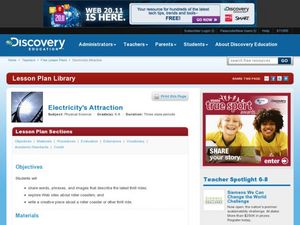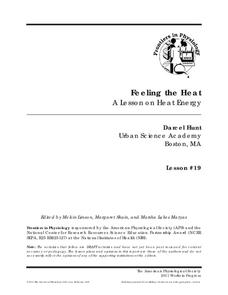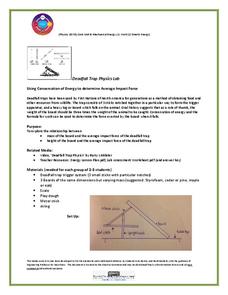Curated OER
Truth in Advertising
Does propaganda exist in popular media? Explore the concept of propaganda in this media education lesson. Middle schoolers examine persuasive techniques used in commercials. They then create commercials that feature truthful information.
Curated OER
Using Java Applets for Inquiry-Based Physics Lessons
Using Java Applets in the physics classroom can be a great way to reinforce scientific concepts.
Curated OER
Electricity's Attraction
Learners explore the different features of a roller coaster using an interactive website. In this physical science lesson, students explain the role of science to make this thrill ride possible. They develop a creative presentation about...
Discovery Education
Jets in Flight
This Discovery Education activity provides the information needed to understand the basics of flight. Before taking off, young pilots learn the eight stages of the engineering design process. Small groups then design and build an...
Earth Day Network
Filtering Water
See the water filtration system up close with a fun science experiment. Young scientists work for several class periods to design a water filter using household objects, and then decide which filter material would be most effective in...
Acoustical Society of America
Musical Instruments
Mix it up and engage learners in a lesson on music and physical science. Using cups, strings, guitars, and voice, the class will experiment with sound vibration and frequency. They'll use each instrument and fill out a worksheet that...
Curated OER
Strawkets and Weight
Students investigate the effect that weight has on rocket flight. They construct a variety of straw-launched rockets that have different weights, observe what happens when the weight of a rocket is altered by reducing its physical size...
Curated OER
Shrinky Dinks® Palettes
Here is a fun and clever lesson for teaching physics classes how to calculate wavelength if given the energy and frequency data. On a worksheet, they compute wavelengths using a table of information that you provide. On a paper palette,...
Virginia Department of Education
The Law of Conservation of Matter
The Law of Conservation of Matter can be complex for young scientists to fully grasp. Use this experiment to help simplify the process as pupils perform two experiments to determine mass: one that melts a substance and the other that...
Curated OER
Solar Kit Lesson #13 - Solarize a Toy
Physical science or technology classes will be invigorated by this challenge: to convert a toy, game, or other device to run on solar power. In doing so, they will design the appropriate solar arrays. This is an A+ lesson, complete with...
Curated OER
Alfonso Ball
Joey Alphonso made up this game, which is played using a gator skin ball and a tennis racket on a basketball court. The simple rules and strategy of the game are explained. This is a high-scoring, run around activity. Everyone can...
Curated OER
Calorie Calculations through Beach Activities
Beach activity separates babes from blobs! Your class learns about calculating the number of calories used during physical activity. A worksheet is provided in which the activity of five different people at the beach is listed for...
Curated OER
Energy At Play
If you can find Tinker Toys™, then this may be a fun assignment for your physical science class. Using the construction set and a few other toys, they examine the forces involved when it they are being played with. For each, they...
American Physiological Society
Feeling the Heat
How do the changing seasons affect the homes where we live? This question is at the forefront of engineering and design projects. Challenge your physical science class to step into the role of an architect to build a model home capable...
Curated OER
All About Circuits ~ Atomic Structure
In this interactive Internet assignment, physical science investigators answer 11 questions about the atom, the subatomic particles, and atomic structure. They can click on "Reveal Answer" to discover if they are correct. They also...
Baylor College
How Much Water Do Humans Need?
Physical or life science learners measure the amounts of water eliminated by intestines and the urinary system, and the amounts lost via respiration and perspiration. In doing so, they discover that the body's water must be replenished...
BioEd Online
Muscles and Bones in Space
Being an astronaut takes not only high mental acuity, but also a high level of physical fitness, especially for those who spend a long amount of time away from Earth, such as the astronauts serving on the International Space Station....
NOAA
El Niño
El Nino, La Nina ... and the Santa Maria? The 11th installment of a 23-part NOAA Enrichment in Marine sciences and Oceanography (NEMO) program explains the mechanism of El Nino/Southern Oscillation. Pupils use previous data to determine...
NOAA
Marine Ecosystems
Be at the top of the food chain when it comes to understanding marine ecosystems. The 21st installment of a 23-part NOAA Enrichment in Marine sciences and Oceanography (NEMO) program investigates marine ecosystems, ocean zones, and food...
American Physiological Society
It’s the Heart of the Matter
Get the class jumping for joy with a fascinating look at matters of the heart. Learners perform physical tasks, collect and analyze heart rate data, and study conditions that affect heart health. Use the action-packed lesson plan to...
Curated OER
The Chemistry of Refining Crude Oil
Consider our energy sources: wood, coal, oil, uranium. Learners compare the pollution to energy produced for each. They practice fractional distillation of an alcohol/water mixture to simulate the process of refining crude oil....
Pearson
The Chemical Context of Life
An educational presentation includes atoms, molecules, the four major elements, as well as neutrons and protons. Additionally, slides focus on atomic number, mass number, atomic weight, polar and nonpolar covalent bonding, ionic bonds,...
University of Saskatchewan
Using Conservation of Energy to Determine Average Impact Force
Explore the center of gravity with your science class as they create a deadfall trap with common materials. They research the concepts of energy conservation and gravitational force before dividing into small groups to create a model of...
NOAA
Ocean Layers II
Now that you know the ocean has layers, let's name them. The seventh installment of a 23-part NOAA Enrichment in Marine sciences and Oceanography (NEMO) program covers terminology associated with ocean layers, such as thermocline and...

























